We all love pastry, and it has become an integral part of the life of any modern person. But most diets prohibit the use of any baked goods, sweet or salty. What if I tell you that the keto diet is a pleasant exception? What if you can enjoy chocolate cookies, vanilla donuts, amazing cinnamon rolls, crusty bread, or magic chicken and mushroom pie? And all these delicious foods are going to be low-carb! Don’t believe it’s real? But in vain, it is quite possible!
But first, we need to learn everything about the primary ingredient in any baked goods. So what about flour? You know that the keto diet limits your daily intake of carbohydrates to 20 grams per day, and these carbohydrates should mainly come from vegetables. Is flour keto, and can you consume it during a low-carb diet?
In this case, the answer will not be simple. I can say that in the classical sense, flour is not keto. But we are talking about wheat flour and other high-carb types that are prohibited on the ketogenic diet. However, you can use other types of flour because they are so low in carbohydrates that they are great for your low-carb diet. Thanks to these types, you can enjoy your favorite baked goods without worrying about ketosis.
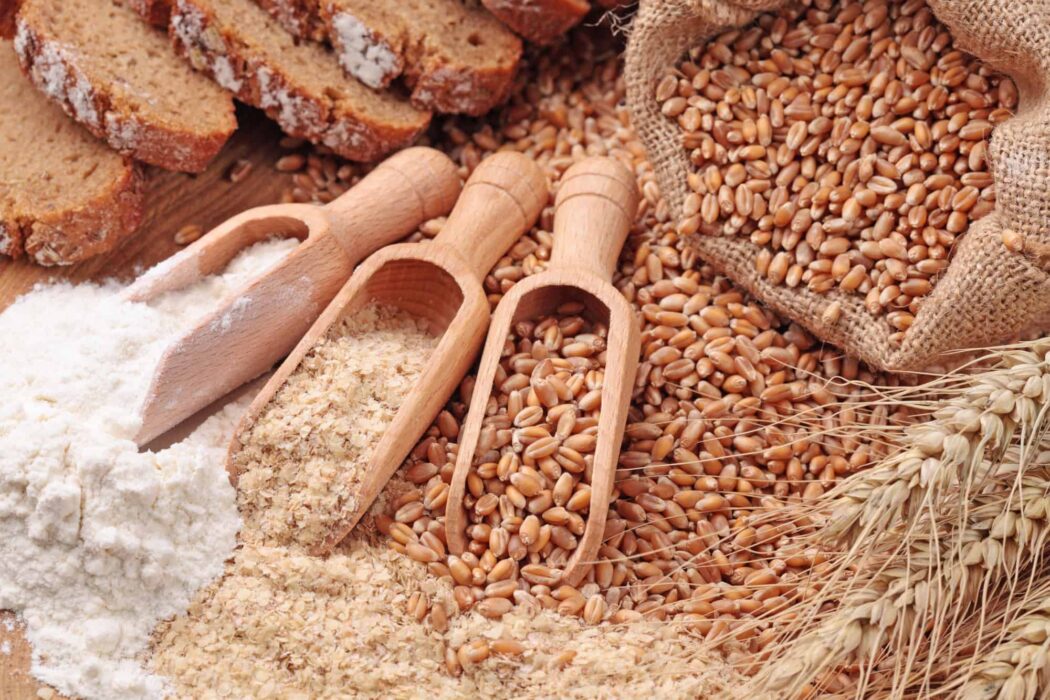
How many carbohydrates are in flour, and why should you avoid it on a keto diet? What are other types of flour high in carbohydrates? And what flour can you safely use for keto baking and how to do it correctly? What are the health benefits of keto flour? There are a lot of questions about this, but I have all the answers that will help you. Let’s figure it out together!
What is Flour?
When we hear about flour, we usually imagine wheat flour, which people habitually use in many dishes. Wheat flour is a food that is made by grinding wheat grains. It has a pleasant taste and high nutritional value and is the main product for making pastry.
Flour contains elements necessary for making bread, including starch and gluten particles, which give the dough the desired thickness. In addition to the bakery, flour is used to make tortillas, pasta, pies, pancakes, and so on.
If you care about your body, it’s time to think about replacing wheat flour. Various types of flour are available in stores today. If you really want to use wheat flour, then I recommend paying attention to whole grain type without additives and chemical elements.
Is Cornstarch Keto? 7 Low-Carb Alternatives
However, you can try buckwheat, corn, barley, rye, oatmeal, rice, nut, chia, pea, and lentil flour. This flour contains a minimum of harmful substances and a maximum of useful microelements and vitamins. For example, coconut flour has a lot of iron, phytoncides, tannins, and other useful microelements and vitamins. And sesame seed flour contains essential amino acids, and vitamins C and B.
Is Flour Bad for You?
Many types of research have focused on the dangers of wheat flour, most often the gluten it contains. Sales of gluten-free products have doubled over the past five years. What is gluten, and why is it so bad?
Gluten is a vegetable protein found in grains such as rye, wheat, and barley, and it makes the dough elastic and helps the pastry keep its shape. And since flour is not only found in pasta and baked goods, gluten can be found in sauces, beer, chips, candies, meat substitutes, and even in soy sauce, flavored tea, and certain types of coffee.
An extreme degree of gluten intolerance is called celiac disease. It used to be thought that mainly children are exposed to it, and it goes away with age. However, recent studies show that adults suffer from it at least as often. In different countries, celiac disease is diagnosed in about 1% of the population. However, it is only a fifth of those actually affected by it. The classic symptoms of celiac disease are bloating, diarrhea, and weight loss from gluten-containing foods. In difficult cases, the thyroid gland is affected, the strength of bones and teeth is impaired, and the risk of developing cancer increases.
Celiac disease is inherited. The gene responsible for overreacting to gluten may not reveal itself throughout life or “start” due to stress: a severe illness, surgery, emotional crisis, or pregnancy.
There is no cure for celiac disease, but a gluten intolerant person can lead an everyday life simply by eliminating anything that contains this irritant. There is an opinion that gluten is harmful to absolutely all people, as it damages the cellular structure of the intestine. And while there is no research to support this for sure, modern nutritional science recommends eliminating gluten from any healthy dietary plan.
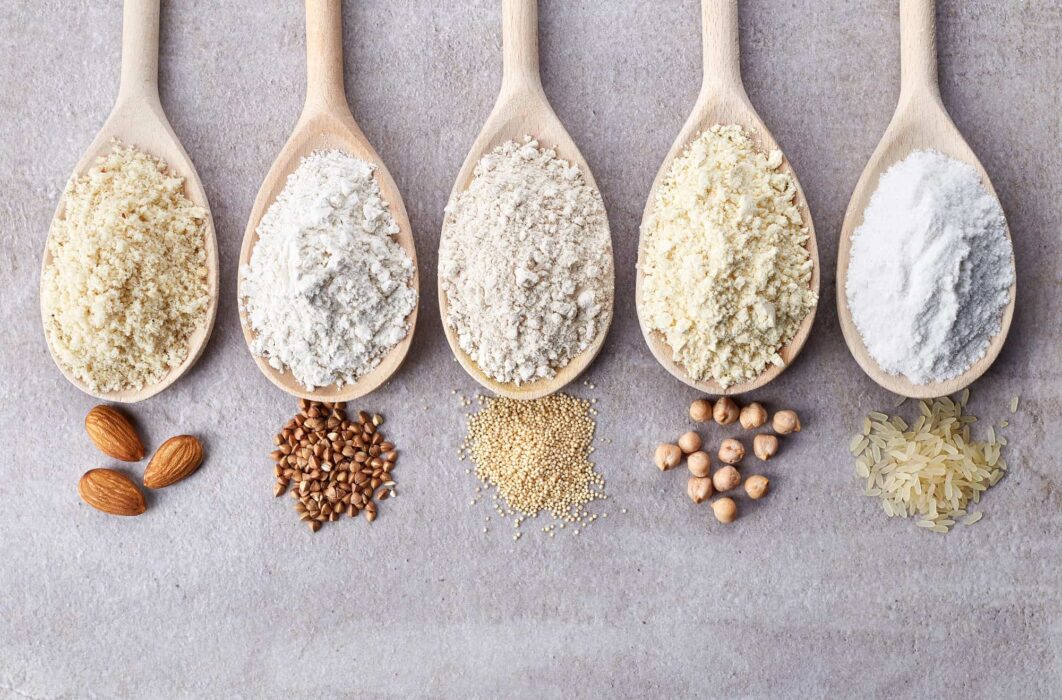
Is Flour Keto?
It is a too general question that requires a more detailed answer. There are many different types of flour, and each has its own amount of carbohydrates and various health benefits. I will tell you more about all kinds of flour, so let’s learn the details together.
High-Carb Flour Forbidden on Ketogenic Diet
Let’s start with types of flour, which are high in carbohydrates and are not suitable for the keto diet. Here are the main types:
Wheat Flour
There are many different types of wheat flour, which differ in their processing and culinary properties. Here are the main ones:
- White flour contains 80% starchy carbs, 10% protein, 28% gluten, 0.15% fiber, fat, and sugar. This type of wheat flour is used to make high-grade flour food. It has good baking properties, and white flour baked goods have a good shape and fine porosity. White flour is ideal for puff pastry, shortcrust pastry, and yeast dough.
- White whole wheat flour comes in white with a gray and yellow tone and contains 75% starchy carbs, 15% protein, 30% gluten, 2% sugar, 1% fat, 0.3% fiber. This flour is good for baking rolls, pies, pancakes, and so on.
- Whole wheat flour has a yellowish and gray tint, and contains 70% starchy carbs, 15% protein, 25% gluten, 2% sugar, 2% fat, and 0.7% fiber. Baking made from such flour turns out to be fluffy and porous. It is mainly used for baking bread and non-flavored flour foods.
Excessive consumption of wheat products, especially sweet baked goods, is fraught with health problems. However, a complete rejection of bread is advisable only for those who have an intolerance to this product or allergies. Also, wheat flour should be forbidden for people on a low-carb diet.
In moderation, bread is harmless and even healthy, especially when it comes to whole grain baked goods with the addition of wholemeal flour and bran. This category of food is not prohibited by nutritionists but rather encouraged. With such bread, you receive B vitamins, vitamin E, vitamin K, zinc, manganese, magnesium, selenium, chromium, and dietary fiber. Sometimes the bread is presented as a medical food product. Due to its good absorption, it is indispensable for gastrointestinal tract diseases in the recovery period after operations, injuries, protracted illness, and exhaustion.
Corn Flour
Corn flour contains calcium, magnesium, potassium, iron, B vitamins. It is rich in starch and is quite easily absorbed by the body. There is more or less fiber in corn flour, depending on how it is refined.
Unlike wheat, corn is a gluten-free crop, which is important for healthy diets and vital for people with a hereditary disorder such as celiac disease.
Is Corn Keto: Main Reasons to Avoid It during Weight Loss
Corn flour helps people suffering from a wide variety of diseases. Foods made from it are useful for people with anemia and impaired bile secretion or bowel function. Such food is also useful because it has diuretic properties and removes the most harmful substances and fat accumulations from the body.
Is corn flour keto? Unfortunately no. It contains 70.2 grams of carbs per 100 grams, plus 7.2 grams of protein and 1.5 grams of fat. This amount of carbs is too much for your keto diet.
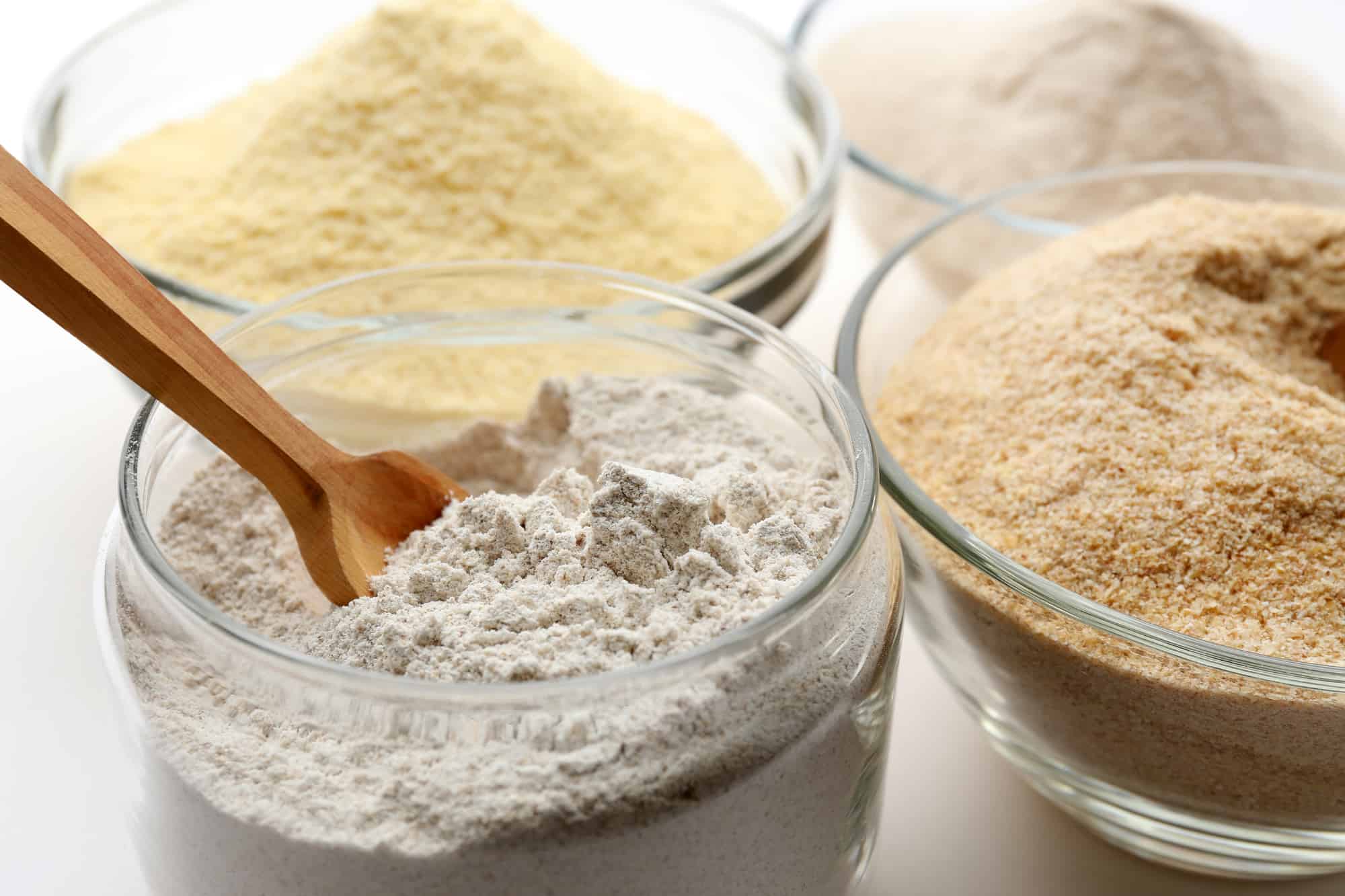
Rye Flour
Rye flour differs from wheat flour in a darker shade and has a low gluten content. Therefore rye bread and rolls retain their freshness for a long time. However, the lack of gluten affects the volume of baked goods – they are not so fluffy but denser, moister, with a sour taste. To eliminate this disadvantage, it is recommended to mix rye flour with wheat flour. In addition to bread, rye flour makes delicious muffins, cookies, tortillas, pancakes, buns, etc.
Rye flour is useful because it contains a large amount of bran, and in terms of the content of vitamins, proteins, potassium, iron, sodium, and magnesium, it surpasses wheat flour. Baking with rye flour lowers cholesterol levels, stimulates metabolism, and improves the functioning of the heart and stomach. Rye flour is used in diabetic diets because rye is a slow carbohydrate and is broken down gradually, preventing blood glucose levels from rising above normal.
The benefits of rye flour also lie in the fact that it removes salts, toxins, and excess fluid from the body. It increases immunity and is a source of complex carbohydrates. No harm from rye flour has been identified. However, people with increased stomach acidity and ulcers should refrain from this type of flour.
Is rye flour keto? No, this type of flour contains too many carbohydrates, namely 62 grams per 100 grams. Also, rye flour contains 8.9 grams of protein and 1.7 grams of fat. As you can see, this proportion of nutrients is not keto-friendly at all.
Oatmeal Flour
In terms of their amino acid composition, oat grains are rightfully considered to be especially similar to muscle protein, and this makes them a useful dietary product. In addition, oats are rich in easily digestible carbohydrates and help our bodies produce the hormone serotonin, which is responsible for a good mood and recovery of the whole body.
Oatmeal is low in starch and high in plant fiber and fat. It contains essential amino acids and vitamins A, B, E, choline, enzymes, tyrosine, copper, and essential oils. It also has trace elements, including silicon, which plays a special role in metabolism. Also, oat flour contains mineral salts – calcium, phosphorus, and dietary fiber.
Another great feature of oatmeal flour is that it contains both soluble and insoluble fiber. It can restore the intestinal microflora and also works as a cleansing for the stomach, removing toxins from the body. It lowers glucose levels and also reduces the body’s need for insulin, and decreases gastric secretion.
Unlike other cereals, oats have in their composition a special, incomparable complex of organic compounds, which is the main help in the treatment of various liver diseases.
Is oatmeal flour keto-friendly? Again, the answer is no. It contains 64 grams of carbohydrates, 13 grams of protein, and 7 grams of fat. This proportion is healthier than wheat flour but still not suitable for keto.
Buckwheat Flour
Buckwheat flour is another type of flour that is famous for its unique taste and vitamin composition. Its consistency differs little from wheat flour, perhaps only in color, but buckwheat flour can bring much more benefits.
The composition of buckwheat flour is rich in useful macronutrients and microelements. It also contains many vitamins such as E, C, PP, and B vitamins. Buckwheat flour also contains potassium, sodium, phosphorus, iron, iodine, magnesium, calcium, copper, fluorine, sulfur, zinc, and many others.
Let’s talk about the benefits of buckwheat flour for the body. Its regular use can significantly improve health, namely:
- stabilize the normal functioning of the nervous system, as well as normalize the brain activity;
- improve blood circulation, help get rid of cholesterol;
- strengthen the immune system, and ensure its normal functioning;
- normalize metabolism;
- improve the skin renewal process, strengthen hair and nails;
- normalize the work of the intestines and pancreas;
- improve the process of digestion and assimilation of food.
Is buckwheat flour low-carb? No. It contains 71 grams of carbohydrates per 100 grams, 14 grams of protein, and 1 gram of fat. That’s too many carbs for your keto diet.
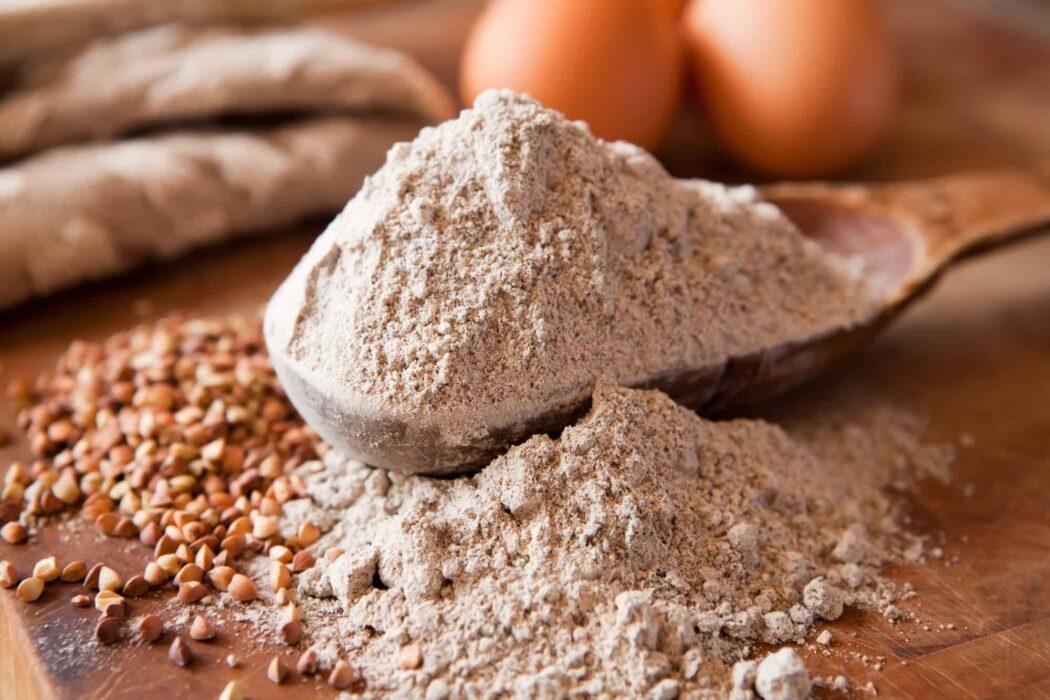
Amaranth Flour
Amaranth flour is gluten-free, so it can greatly increase the nutritional value of gluten-free recipes. It is extremely important for gluten intolerant people as it contains the beneficial amino acid lysine. Basically, cereals contain small amounts of lysine, but not amaranth. Thanks to the high content of this vital amino acid, it becomes a source of whole protein. Amaranth contains about 13% protein, or 26 grams per serving, much higher than other grains. In comparison, long-grain white rice contains only 13 grams of protein.
Amaranth flour is a source of essential minerals and vitamins: calcium, magnesium, sodium, phosphorus, and iron. One cup of unprocessed amaranth contains 31% of the RDI for calcium, 14% for vitamin C, and 82% for iron. It is good for the heart as it can lower cholesterol levels.
Is amaranth flour keto? It also does not refer to low-carb foods and is not suitable for a ketogenic diet. This flour contains 62 grams of carbohydrates per 100 grams, 12 grams of protein, and 2 grams of fat.
Keto Flour Allowed on Low-Carb Diet
Don’t be discouraged after this list of forbidden keto flours. Yes, these types are too high in carbohydrates, and you will have to avoid them. However, I will present you with even more options that are perfect for keto proportions. You can use the types of flour listed below to make any baked goods you like. And the result will not only be keto-friendly, but it will also be delicious! Let’s take a look at each type of keto flour separately.
Coconut Flour
We already know about the amazing benefits of coconut oil, but what about coconut flour? It is a powerful source of nutrients, including monounsaturated fatty acids, fiber, and other nutrient minerals such as iron, manganese, and copper.
Coconut flour contains no nuts. For those with nut allergies, coconut flour is by far the best option. While it is possible to be allergic to coconuts, and nuts, in general, are among the seven most common allergens on the planet, coconut is not in this category.
Coconut flour is rich in fiber, medium-chain triglycerides (MCT), and plant-based iron. MCT is a type of fat that has a number of health benefits during the keto diet, such as weight loss, protection from bacteria, viruses, and improved brain and heart health. Coconut flour contains fiber, which helps control blood sugar levels by significantly slowing down the sugar entering the bloodstream.
The high fiber content of coconut flour also improves digestion. Most of the fiber is insoluble, which increases stool volume and helps move food smoothly through the intestines, reducing the likelihood of constipation.
Is coconut flour keto? Yes, definitely! It contains 9-12 g of carbohydrates, 4-5 g of fiber, 12 g of fat, 10 g of protein, and only 5-7 g of net carbs per 100 grams. The exact amount of carbohydrates depends on the type of flour. If you see more quantity on the package, you should skip this flour, as it may contain added sugar.
Note that, having a slight coconut flavor, the flour takes on the flavor of other ingredients mixed with it. I recommend that you use two tablespoons of liquid for two tablespoons of coconut flour. Otherwise, the cooked food will become too dry.
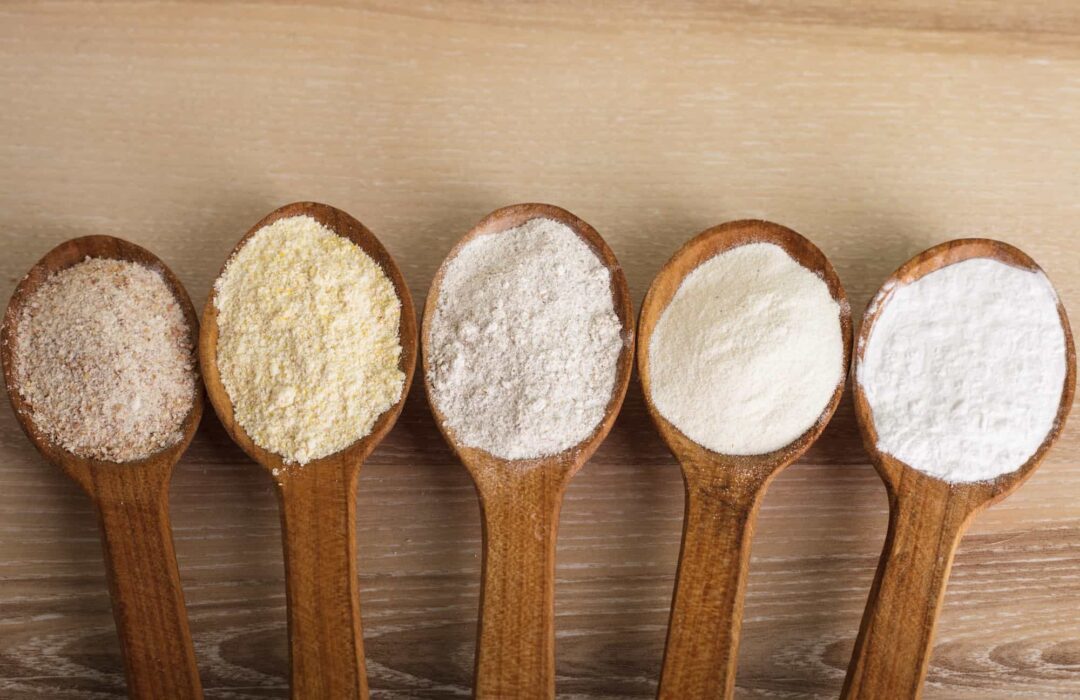
Almond Flour
Like coconut flour, almond flour may be the best option for those on a low-calorie or ketogenic diet due to its even lower carbohydrate content.
Almond flour is a healthy alternative to wheat flour. Its advantage is that it is gluten-free, so it is good to use it in baked goods and the preparation of many other dishes. It is also good for those who are allergic to gluten or follow a diet for other medical reasons. This flour is sold in the store, although I prefer to make it myself. You just need to dry the almonds in a pan and grind them in a blender until they are powdered.
In terms of benefits, almond flour helps improve cholesterol levels, overall heart health, blood sugar, and energy levels. It has even been shown to help fight certain types of cancer. In addition, almond flour is a good source of vitamin E, iron, manganese, magnesium, potassium, and calcium.
Keto Mug Brownie: 5 Quick and Easy Recipes
Is almond flour keto-friendly? Yes, absolutely. 100 grams of almond flour contains only 13 grams of carbohydrates, 8 grams of fiber, 4 grams of net carbs, 16 grams of fat, and 14 grams of protein. These are the perfect keto proportions. However, as with coconut flour, pay attention to labels to avoid added sugar.
Flaxseed Flour
Flaxseed flour is loaded with healthy fats, especially Omega-3s. Fats play an important role in human nutrition, providing the body with essential fatty acids Omega-6 and Omega-3 – fat molecules that our body cannot synthesize on its own.
These acids are the building blocks of cell membranes, eye tissues, and nerves, so maintaining an optimal balance of these nutrients in the diet is very important for health. Flaxseed flour also improves skin and hair health, helps lower cholesterol, maintains a healthy digestive system, and improves hormonal imbalances. It is a powerful source of antioxidants, lignans.
Lignans have antioxidant properties, protect our cells from negative environmental influences and reduce the risk of cancer. Like fiber, lignans are found in the hard particles of seeds, so to get them, you need to use flour, not oil. Flaxseed contains the highest amount of lignans compared to other plants.
Is flaxseed flour keto? Yes, absolutely. 100 grams of flaxseed flour contains 7g of carbohydrates and 7g of fiber, giving flaxseed flour 0g of net carbs. It also contains 9 grams of fat and 22 grams of protein.
Sesame Flour
Sesame flour is made by grinding whole sesame seeds or sesame oil cake leftover from oil extraction. It does not contain gluten and consists of more than 40% vegetable protein, has a delicate nutty taste and aroma.
Sesame flour has a high nutritional value:
- amino acids: arginine, proline, methionine, tryptophan, threonine, glycine, serine, cysteine, alanine, and others;
- saturated fatty acids;
- mono and polyunsaturated acids;
- lignans;
- pectin substances;
- carbohydrates;
- antioxidants;
- phytosterols;
- vitamins: A, PP, group B
- minerals: manganese, copper, phosphorus, calcium, zinc, iron, potassium.
Sesame flour can be an excellent natural remedy in the treatment of diseases of the gastrointestinal tract and the cardiovascular and reproductive systems of the human body. In addition, sesame flour has a beneficial effect on diseases of the musculoskeletal system and anemia, respiratory diseases, and dermatitis.
Is sesame flour keto? Yes, it’s keto-friendly in small amounts. This flour contains 26 grams of carbs and 26 grams of net carbs, so you should use 1-2 tablespoons at a time. Despite its high carbohydrate content, sesame flour is low on the glycemic index. It does not increase your insulin, so it is suitable for keto in moderation. It has 37 grams of fat and 30 grams of protein, so this is the right keto ratio.
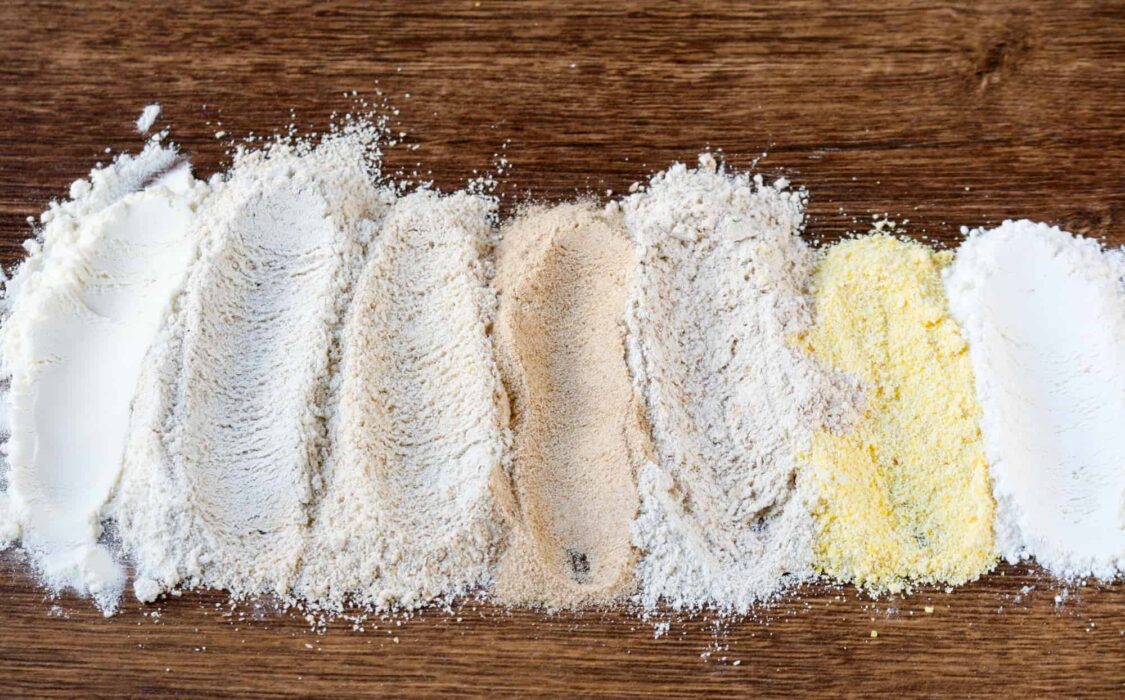
Sunflower Seed Flour
Sunflower flour is rich in natural proteins, at least 50%, and many amino acids that are essential for health. For example, the lysine content in the protein of sunflower flour is much higher than in wheat gluten, and there is much more methionine in it than in the popular soy flour. In addition, sunflower flour is rich in an amino acid called arginine, which is required for a child’s proper development and functioning.
Another particularly valuable property of sunflower flour is its very fast and complete assimilation. Doctors and nutritionists recommend including sunflower flour in food in the presence of various diseases of the lungs, kidneys, stomach and duodenum, gastritis, and high acidity. This food is a true repository of valuable vitamins and elements. Therefore, it is often prescribed to strengthen the body in case of vitamin deficiency.
Is sunflower flour keto? Yes, the answer is positive. 100 grams of sunflower flour contains 48 grams of protein, 2 grams of fat, and 35 grams of carbohydrates, of which 7 grams are fiber and 28 grams of net carbohydrates. As with sesame flour, sunflower flour is keto in moderation. You should add a couple of tablespoons to baked goods for great taste and health benefits. This flour does not raise blood sugar, so it is safe for your ketosis in small amounts.
Hazelnut Flour
These are nothing more than ground hazelnuts. This type of flour is natural and very healthy. It has a pleasant milky color with small dark spots and a delicate nutty aroma. As a rule, for the manufacture of hazelnut flour, nuts are dried well. Then the technology of gentle grinding is used to preserve all the useful substances. Hazelnut flour has a high content of fatty acids, which oxidize rather quickly, so it should be stored in a dark place in a tightly closed paper bag. The shelf life of such flour is no more than eight months. Hazelnut flour prepared at home immediately before preparing the dish will be the most useful.
Keto-Friendly Nuts: What to Eat and What to Avoid
Hazelnut flour is a source of vitamins B1, B2, B6, and E as well as trace elements – potassium, calcium, magnesium, sodium, zinc, and iron. Due to its rich chemical composition, hazelnut flour helps to reduce blood cholesterol levels, protects against cardiovascular diseases. It is indicated for diabetes mellitus, removes toxins from the body, improves immunity, and is recommended for osteoporosis.
Is hazelnut flour keto? Yes, it is definitely keto-friendly. It contains 15 grams of protein, 61 grams of fat, and only 9 grams of carbs per 100 grams, of which 3 grams is fiber and 6 grams are net carbs. So feel free to add hazelnut flour to your cookies and enjoy the delicious taste!
Chia Flour
The first important advantage of chia flour is the absence of gluten. The second is the presence in the composition of healthy fats, fiber, protein, as well as minerals, and B vitamins.
Also, the chia seeds contain a whole set of nutrients: vitamins A, E, and B vitamins, phytosterols, flavonoids, and other polyphenolic antioxidants, calcium, iron, potassium, magnesium, manganese, copper, selenium, phosphorus, choline, zinc.
Chia seed flour is a good choice for those who watch their diet and exercise and those with gastrointestinal problems. Because of its high fiber and amino acid content, chia seed flour is used in sports blends. In cooking, flour can act as a binder, or thickener, in baked goods (replacing eggs) and sauces.
Is chia flour keto? Yes, as are the chia seeds themselves. This flour can be eaten without restriction, as it contains 28 grams of carbohydrates, of which 28 grams are fiber, which means 0 net carbs. Chia flour does not cause insulin spikes and is therefore keto-friendly. It also contains 5 grams of fat and 13 grams of protein.

Walnut Flour
It is a natural food rich in protein, vegetable fats, and almost no carbohydrates. It has a pleasant walnut flavor with a distinctive bitterness. As a rule, the technology of gentle grinding of nuts is used to preserve all the nutrients when making walnut flour.
High-quality walnut flour should contain only walnuts and nothing else because it is a useful vitamin and microelements source. It contains B vitamins, vitamin C, PP, iron, zinc, and copper. It is also an excellent source of beneficial Omega-3 and Omega-6 polyunsaturated fatty acids.
Walnut flour is useful for all organs and systems of our body. It contains antioxidants, helps improve the quality of sleep, has a beneficial effect on the functioning of the brain and nervous system, and aids digestion due to its high fiber content. In addition, baked goods made from such flour can be safely included in the diet for people with gluten intolerance.
Is walnut flour keto? Yes, it’s a great choice for a low-carb diet. This flour contains only 3 grams of carbs, 18 grams of fat, and 15 grams of protein per 100 grams. It is the perfect proportion for a keto diet.
Useful Tips
All types of keto flour are gluten-free, which is their main benefit. But this is also one of the small obstacles to perfect baking. The fact is that it is gluten that gives the dough the necessary stickiness; without it, your cookies can simply fall apart.
However, there is a solution and a very simple one. It is called psyllium, and it is a completely keto food with a lot of dietary fiber and zero net carbs. Psyllium is actually psyllium bran, and it contains many beneficial substances for your health. It absorbs water well, swells, and helps your dough gain the necessary stickiness.
It is usually enough to add 1 to 2 grams of psyllium for about a couple of servings of baked goods. The exact dosage depends on the recipe. It has no taste and will not spoil your cookies. Psyllium comes in the form of a husk or powder. I prefer to buy powder (or grind the husk into powder in a blender) because it is more versatile and suitable for baked goods with a delicate texture. I add the husk to coconut cookies or muffins, allowing the flour to be coarsely ground for a delightful experience.
How to choose keto flour? It all depends on your taste choices. I like to add sesame flour to tortillas, almond flour to tarts, and mix several types of flour for cakes. I’ll walk you through the ins and outs of using flour in my keto baking recipes.

Conclusion
In summary, wheat flour is not keto like some other types of flour. It contains many carbs, which belong to the starchy group. For this reason, such flour is not suitable for a state of ketosis.
However, some flour is keto. Many types of flour are low in carbs and are suitable for the keto diet. Basically, all of these flours are made from nuts and seeds. Add this flour to your keto diet, come up with new recipes and let your diet not be boring!